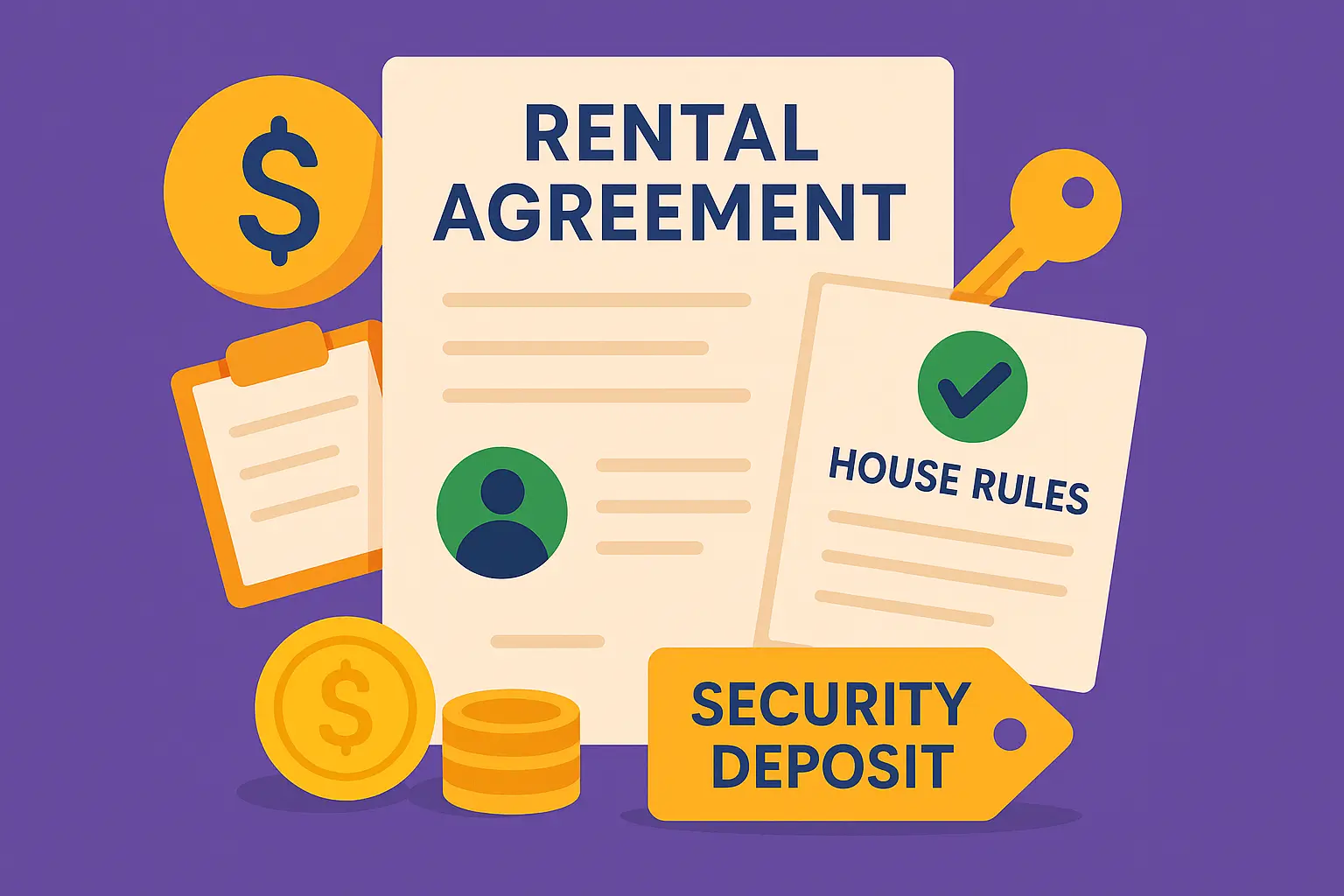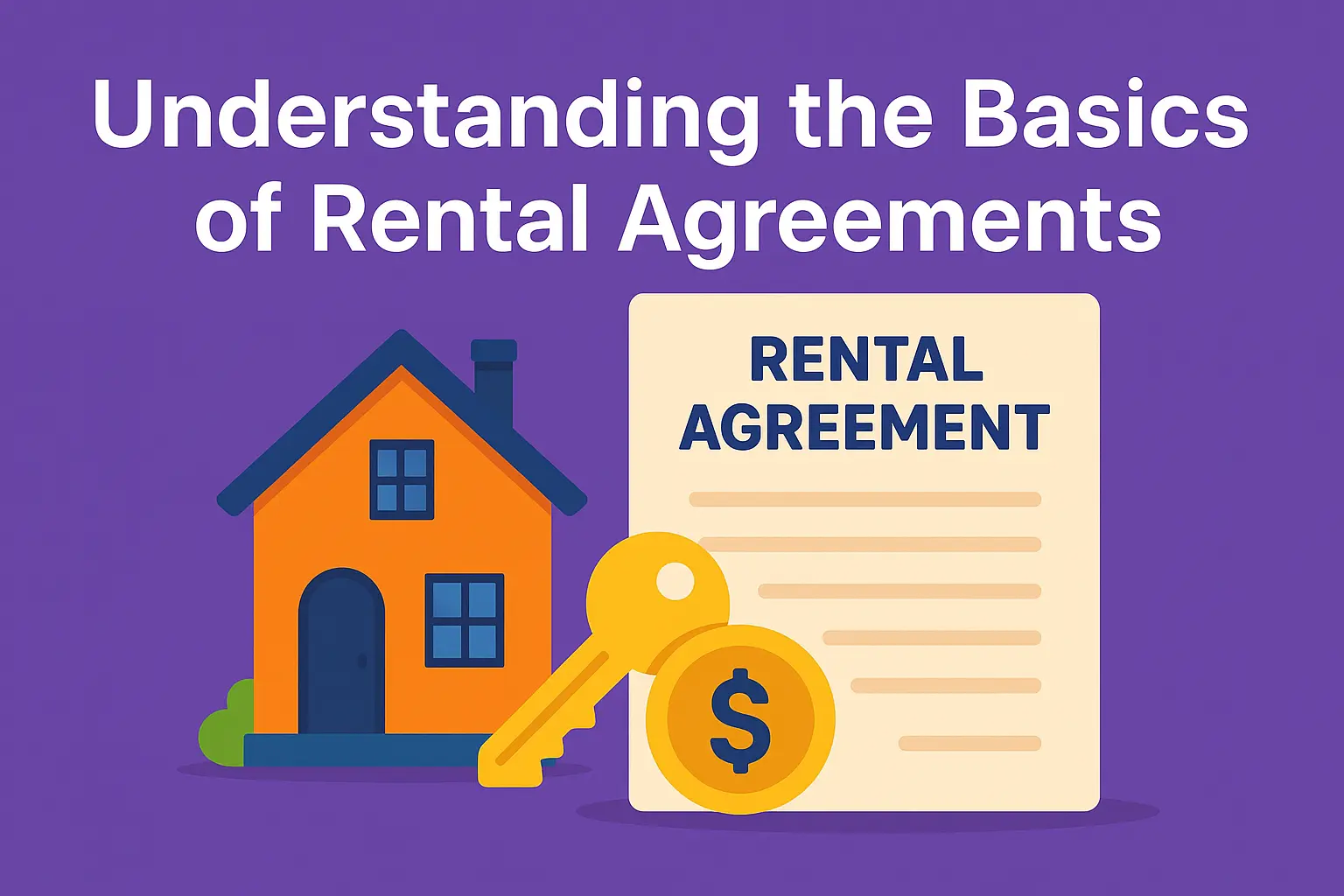What is a rental agreement?
Simply put, it's a legally binding contract between a landlord and renter. It outlines the terms and conditions of the rental, ensuring both parties are protected.
The intricacies of rental agreements can be daunting. From rent details to property rules, each component plays a vital role.
By understanding the basics of rental agreements, property owners and investors can transform their property management experience into a profitable and stress-free venture.
What is a Rental Agreement?
A rental agreement is more than just paperwork. It's the foundation of a landlord-renter relationship. This document spells out responsibilities, expectations, and obligations.
Unlike leases, rental agreements are generally short-term, often used in vacation rentals and fully furnished executive rentals. Most often, they renew automatically each month. This offers flexibility for both landlords and renters.
A rental agreement also sets rules for property use. These rules might include things like noise restrictions or pet policies. Such clauses ensure harmony and good maintenance.
Legal compliance is another key element of rental agreements. By adhering to local laws, these contracts safeguard landlords from potential disputes. They also protect renters’ rights.
In sum, a well-crafted rental agreement serves as a roadmap. It's vital for smooth property management, helping to avoid misunderstandings and conflicts. Understanding this essential tool can elevate your property management strategy.
Standard Components of a Rental Agreement
A well-drafted rental agreement contains several essential parts. These components help ensure clarity and transparency.

First and foremost, the agreement must state the rental property's address. It should also include names of both the renter(s) and landlord. These details form the framework of the contract.
Rental agreements should clearly set out the rent amount. The agreement must also specify when payments are due. Including any late fees policies is crucial for transparency.
Beyond rent, security deposit and fees need attention. The agreement should indicate how much deposit is required. It must also detail conditions for deposit return.
A comprehensive rental agreement also addresses property maintenance. Stipulating who handles repairs can prevent disputes. Clear delineation of duties benefits both parties involved.
Standard rental agreements should list house rules. These might cover noise limitations or guest policies. Detailing such expectations supports harmonious living conditions.
Another important section involves renewal terms. The agreement should clarify automatic renewal conditions, if any. Clarity in termination procedures is equally vital.
Local laws often influence rental agreement contents. Hence, including legally required disclosures is necessary. Compliance ensures a legally sound and enforceable agreement.
Lastly, clauses addressing renter behavior can enhance property care. Encouraging renter responsibility through clear terms fosters property appreciation. Such clauses are beneficial for both landlords and renters.
Rent and Payment Terms
Rent terms form the backbone of any rental agreement. They clarify financial expectations for both parties. Knowing the exact rent amount ensures smooth transactions.
The agreement must specify the due date each month. This prevents confusion or missed payments. It's also wise to outline payment methods accepted.
Including details on late payment penalties is essential. Such clauses can deter late payments. They also offer clear recourse if payments are delayed.
Documenting potential rent increases is equally important. Renters should know when and how rent might rise. Transparent terms help maintain a positive landlord-renter relationship.
Security Deposit and Fees
Security deposits are standard practice in rental agreements. They offer landlords a financial safety net. This deposit often covers potential damages or unpaid rent.
The agreement should specify the exact deposit amount. It must also detail the conditions for its return. Transparency in these terms minimizes disputes.
Including a section on additional fees is wise. These may cover cleaning or pet-related costs. Specificity ensures renters are prepared financially.
Clarifying how deposits are managed is crucial. Whether held in trust or another account, renters should know. Transparency fosters trust in the rental process.
Renter and Landlord Responsibilities
Responsibilities form a crucial part of a rental agreement. They clearly define roles, preventing misunderstandings. Both parties knowing their duties fosters cooperation.
Renters often must maintain cleanliness and report issues. Prompt reporting aids timely repairs. This clause supports property upkeep.
Landlords typically handle significant repairs. Specifying this in the agreement clarifies expectations. Renters know whom to contact when issues arise.
Agreements may include policy on subletting or alterations. Renters should seek landlord permission first. Such terms protect property integrity.
Finally, the agreement should encourage renter care. Responsible behavior ensures property value retention. Clear terms promote accountability and satisfaction.
Enhancing Renter Satisfaction and Retention
Renter satisfaction plays a critical role in property success. Satisfied renters are more likely to renew leases. This reduces turnover and vacancy rates.

A well-drafted rental agreement helps manage expectations. It clearly outlines renter responsibilities and property rules. Understanding these fosters a positive rental experience.
Open communication is key to renter happiness. Encouraging feedback helps address concerns promptly. This proactive approach builds trust with renters.
Timely maintenance and repairs are essential. Quick responses to issues demonstrate professionalism. This commitment can significantly boost renter satisfaction.
Ultimately, a focus on renter needs increases retention. Happy renters create a stable rental income. Thus, renter satisfaction is invaluable for long-term success.
The Importance of Compliance with Local Laws
Compliance with local laws is a foundation for successful property management. Local regulations shape rental agreements significantly. Adhering to these laws protects both landlords and renters.
Ignoring legal requirements can lead to severe consequences. This includes fines or legal disputes, which can be costly. Knowledge of these laws helps in drafting lawful agreements.
Local laws often dictate aspects like eviction procedures. Knowing these prevents unlawful evictions. It ensures a fair process is followed, avoiding potential lawsuits. Frequently, a rental agreement doesn’t even require eviction, as it is not a long-term lease, but check with your local laws to be certain.
Laws may also cover health and safety standards. Ensuring properties meet these standards is crucial. It protects renters and shields landlords from liability.
Keeping rental agreements updated with changing laws is essential. This ensures continuous compliance over time. Regular reviews of agreements are a wise practice.
Finally, consulting with legal professionals offers added assurance. Expert advice can help navigate complex legal landscapes. This investment is valuable in maintaining lawful operations.
The Role of Professional Property Management
Managing properties can be complex and time-consuming. Professional property management offers essential expertise and support. This relieves owners of daily operational burdens.

Experienced managers navigate local laws effectively. They ensure compliance with all regulations. This reduces the risk of legal issues for landlords.
Managers excel at renter relations. They handle renter inquiries and concerns professionally. This improves renter satisfaction and retention rates.
Marketing properties is another key role. Managers attract qualified renters through targeted strategies. This reduces vacancy times and increases profitability.
Ultimately, using professional management enhances property performance. It offers peace of mind for investors and owners. The role of property managers in rental agreements is indeed invaluable.
Conclusion: The Value of a Well-Crafted Rental Agreement
A well-crafted rental agreement is a cornerstone of successful property management. It clearly defines the relationship between landlord and renter, reducing misunderstandings. This establishes a solid foundation for property operations.
Rental agreements protect both parties by outlining rights and responsibilities. This legal clarity prevents potential disputes and facilitates smoother interactions. Such agreements often lead to a harmonious rental experience.
Investing time in a comprehensive rental agreement pays dividends in the long run. It enhances renter trust and boosts satisfaction. These factors, in turn, contribute to better retention rates.
Ultimately, rental agreements are not just documents. They are strategic tools that drive profitability and peace of mind for property investors. With professional guidance, they become even more powerful assets.


